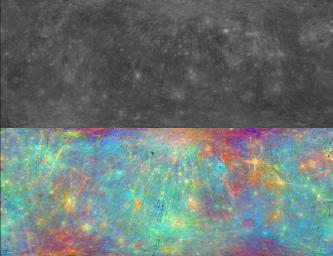
|
Shine a Light on Me
- Click the image above for a larger view
- Full-Res JPEG (1920 x 1476) (435.3 kB)
- Full-Res TIFF (1920 x 1476) (8.5 MB)
Caption:
The Sun's light provides a powerful tool for understanding the composition of materials in the Solar System. Today's image features two views of Mercury provided by the Mercury Atmospheric and Surface Composition Spectrometer (MASCS) instrument . As the Sun's light hits the surface of Mercury, the Visible and Infrared Spectrograph (VIRS) portion of MASCS measures many wavelengths of the reflected light from a single spot on the surface at a time. These observations create a spectral profile of the surface as MESSENGER orbits Mercury. In each panel, the top left corner of the image is 70°N,180°E and the bottom right corner is 70°S,180°E. Most of Caloris basin can be seen along the right edge of each panel. The top panel is a monochromatic image of the interpolated 750 nm reflectance, and the bottom panel shows the same data but in a false color composite selected to highlight compositional variations on the surface.
The monochromatic map is part of a data set that was released to the public earlier this month through the Planetary Data System (PDS). In conjunction with the release, the team hosted a Data User's Workshop at the 45th Lunar and Planetary Science Conference , which is being held this week in The Woodlands, Texas.
Instruments:
Visible and Infrared Spectrograph (VIRS) of the Mercury Atmosphere and Surface Composition Spectrometer (MASCS)
Center Latitude:
0°
Center Longitude:
0° E
Map Projection:
Simple Cylindrical
VIRS Monochromatic Wavelength:
750 nm
VIRS Color Composite Wavelengths:
575 nm as red, 415 nm/750 nm as green, 310 nm/390 nm as blue
Scale:
Caloris Basin is 1,550 km (963 mi) across.
Background Info:
The MESSENGER spacecraft is the first ever to orbit the planet Mercury, and the spacecraft's seven scientific instruments and radio science investigation are unraveling the history and evolution of the Solar System's innermost planet. MESSENGER acquired over 150,000 images and extensive other data sets. MESSENGER is capable of continuing orbital operations until early 2015.
For information regarding the use of images, see the MESSENGER image use policy .
Cataloging Keywords:
| Name | Value | Additional Values |
|---|---|---|
| Target | Mercury | |
| System | ||
| Target Type | Planet | |
| Mission | MESSENGER | |
| Instrument Host | MESSENGER | |
| Host Type | Orbiter | |
| Instrument | Mercury Atmospheric and Surface Composition Spectrometer (MASCS) | |
| Detector | ||
| Extra Keywords | Atmosphere, Color, Infrared, Map, Radio | |
| Acquisition Date | ||
| Release Date | 2014-03-21 | |
| Date in Caption | ||
| Image Credit | NASA/Johns Hopkins University Applied Physics Laboratory/Carnegie Institution of Washington | |
| Source | photojournal.jpl.nasa.gov/catalog/PIA18180 | |
| Identifier | PIA18180 | |
